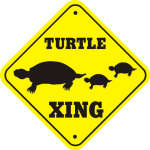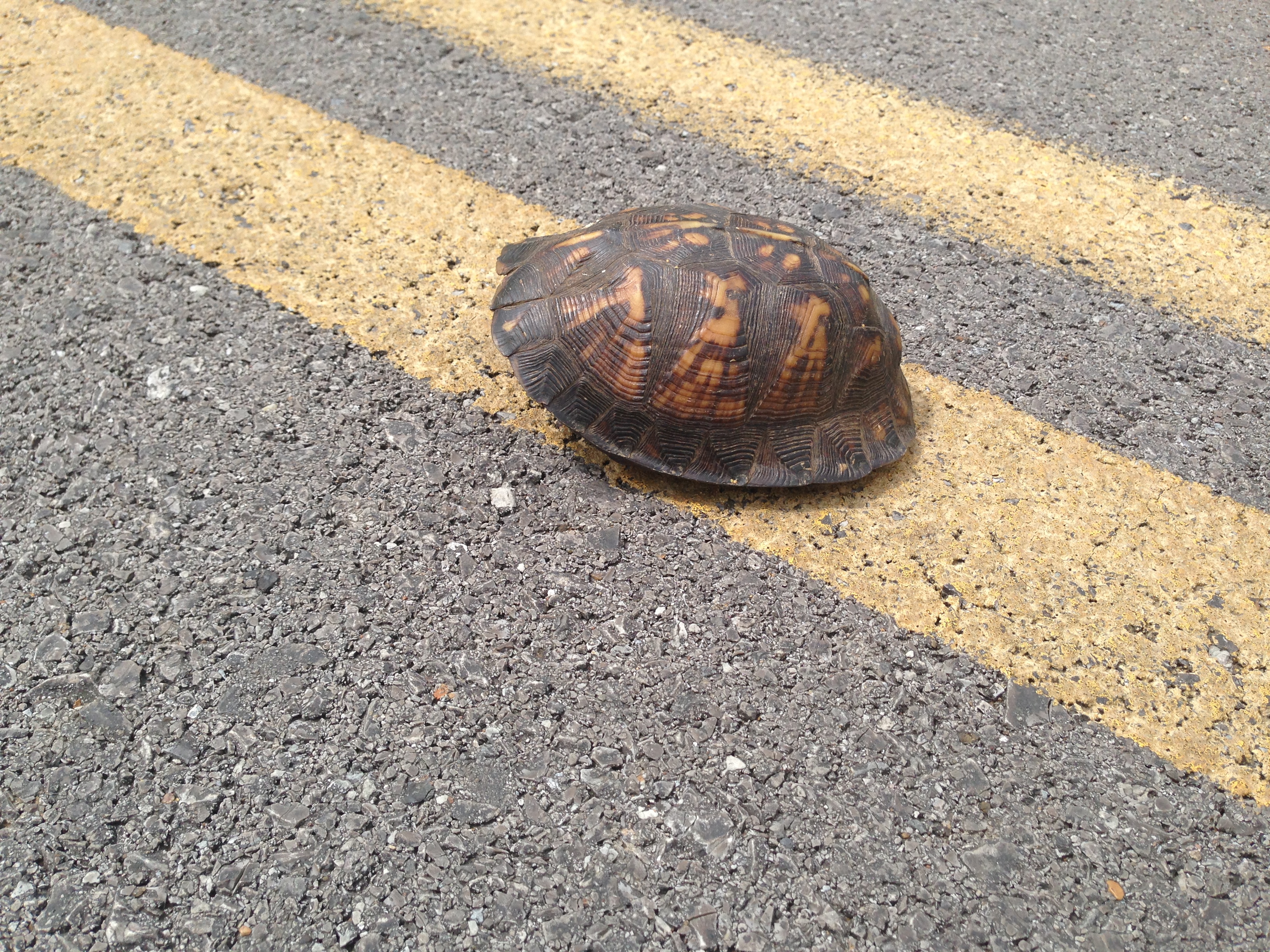It’s spring, which means you can hear the spring peepers singing in the April rain puddles, and turtles are on the move. As if I needed more worry in my day, for some reason they often feel the need to cross a road like the proverbial chicken. I’m that person who stops the van in the middle of the street to usher the little guys off the asphalt onto the safety of the grass. Not a big fan of reptiles, but I make an exception for the turtles.
I’m always sad when I see a crushed shell on the road, some careless driver’s handiwork. It’s not like they’re darting across like those schizophrenic squirrels on steroids: Left! No, right! Fake to the left, then dash right! You’d think the slow and careful turtles would be easy to avoid.
When the kids were smaller, I’d pull over, hop out and usually bring the turtle over to where they were strapped in so they could see its little clawed feet and its head, tucked tightly into the clamped shell. Here, we have the Eastern box turtle, with a mottled orange and green shell, and the snapping turtle, with a pointed beak and spiky shell.
Yesterday, as I was lifting turtle #374 out of harm’s way, it occurred to me how rescuing turtles is a lot like raising kids. We see our children blithely heading down a certain path, one that seems perfectly reasonable to them, but we can see a bigger picture from above, the potential for a crushed shell, so we lovingly reach down and redirect.
They tend to react in one of four ways, whether they’re toddlers or teens. Do you recognize any of these?
The Clamp Down: they see you coming and the force field goes up. Tail and feet pull in, head disappears, and the soft underbelly is protected at all costs (think teenager). Maybe if they ignore you, you won’t see them and you’ll just go away. Nothing here to see, people. Move along. You’re not getting behind that barrier without some serious artillery.
The Squirm: at your approach, they make a panicked dash for the nearest escape. If you pick them up (think toddler tantrum), they suddenly appear to have five arms and six legs, all twirling madly in mid-air. If I just move around enough, she’ll put me down and I am home free. Freedom as the only goal, they dart in a hundred different directions, without reason.
The Bodily Function: usually attempted after the Clamp Down or the Squirm have failed. This is an attempt to so totally repulse you that you just let them do whatever it was they were planning. I don’t know how many times I’ve tried to rescue a box turtle only to have it pee profusely on me (to the great amusement of my children). I choose to see it as the only gesture of gratitude they’re capable of. Peeing, burping, odors of various kinds–all are acceptable if they successfully ward you off.
The Come At Me, Bro: undisguised aggression. Leave me alone or I’ll take you down with me. I once tried to help a small snapping turtle, and that little sucker kept turning to face me in the road as I circled it, actually lunging at me to get a bite. I finally lowered myself to its level and said, Fine! Stay there if you think you know so much, and see what happens! Often this type is so determined to stay on its chosen path that you just have to cringe when the speeding truck tires straddle it and hope that it lives to get a better attitude.
When my brother was very small, my dad brought home a snapping turtle from a fishing trip. He warned my brother that this sort of turtle was always in a bad mood. My grandfather told him repeatedly that if a snapping turtle got a hold of you, it would not let go until it heard thunder. It sat in a box in the kitchen while we ate lunch. At some point, conversation halted as we all heard a crash from the kitchen. When my mother ran in to investigate, my brother stood there beside the empty turtle’s box, his blue eyes wide and innocent. “Where did the turtle go, Mike?” A silent shrug. Then a slight rustle from the trash can. A dazed turtle was trying to climb its way out of the Hefty bag.
Turns out, the temptation of that creature in the box had been too much. The moody turtle had of course bitten him when he’d tried to pick it up. Startled by the pain and the refrain of my grandfather’s warning about thunder, he’d flung the turtle across the room where it had landed in the trash.
From truck tires to trash cans, this type of turtle will no doubt have the hardest life. It seems determined to rack up as many hard knocks as possible in its refusal to accept help or do anything it doesn’t want to.
If we’re being honest, it’s not just parenting where we see these types of reactions to correction. I recognize myself in at least two of these. How often have I been the one in the middle of the road, facing an oncoming Mack truck that I don’t know is on its way, when God reaches down to lovingly redirect? Instead of being grateful, how often have I kicked and screamed, sulked and turned away, certain that I know better, in a determined attempt to stay on my own path?
my own path?
While I might eventually get where I am headed, how much easier and less perilous would it be to yield and be ushered there by one who has the bigger picture? With each turtle I rescue, I feel an elbow’s nudge in my side: see how easy that was? Wasn’t such a big deal, was it? It also gives me a little more empathy for my children. I get it. I know the struggle. Just another turtle crossing.









Bonnie, I love your analogies! You are so right! I recognize myself and my family in the reactions to redirection. Thank you for sharing!
How in the world do you come up these awesome stories?!